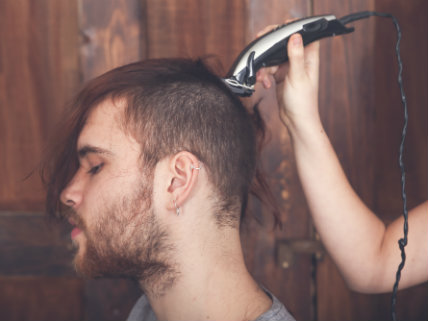Maryland Decriminalizes Unlicensed Barbering; Jacks Up Fines for Unlicensed Barbering
The state won't throw people in jail for cutting hair without a state-issued permission slip, but it's only a marginal step forward.

If you're one of those glass-half-full people, the good news is Maryland can no longer throw people in prison for the supposed crime of cutting hair without a license.
Reforms to the state's barber licensing laws unanimously passed the state legislature earlier this month and were signed Tuesday by Gov. Larry Hogan. The new law eliminates a provision that allowed unlicensed barbers to be tossed in jail for up to 30 days. That's a welcome change to a completely overblown punishment—under Maryland law, first-time DUI offenses come with just 48 hours of prison time—and another step towards fixing onerous licensing laws, similar to changes other states have made this year.
If you're one of those glass-half-empty people, though, you might notice that cutting hair in Maryland without a government-issued permission slip will now carry fines of up to $1,000. Previously, fines had been capped at just $100.
I suppose this counts as a marginal victory for the freedom to cut hair without the government being involved, but it's definitely of the two-steps-forward-one-step-back variety.
"Instead of tinkering with punishment, Maryland legislators should recognize that occupational licensing is an anti-competitive scam that benefits licenses and not consumers," says Lee McGrath, legislative counsel for the Institute for Justice, a libertarian law firm that advocates for changes to state-level licensing laws, told me via email.
Maryland has the 10th most burdensome licensing laws in the country, according to a 2012 IJ report that looked at licensing laws in all 50 states. While the requirements for the state's 42 different occupational licenses (including things like animal trainer and tree trimmer) vary widely, on average workers can expect to pay about $200 and spend more than 400 days on mandatory education to qualify for a license. Becoming a barber requires 280 days of training and passing two exams.
Licensing serves as a significant barrier to entry for potential workers, and there's better ways to make sure that barbers are qualified to do the job. Market-based regulations, which are more effective than ever thanks to apps like Yelp, are probably all that's really needed to sort out good barbers from bad ones. Licensing should only be used when there is a compelling health and safety interest at stake—and, no, bad haircuts don't count.
"There have been no reports of bad barbicide or bad haircuts in Maryland," McGrath says. "Why is the government intervening?"


Show Comments (25)